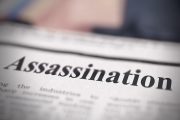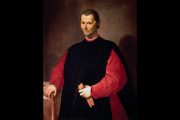
“White lightning, I presume…,” quipped an observer. This was one reaction to reports that a lightning strike destroyed a large Ohio mural honoring George Floyd. Another reaction, among “those who see the Hand of God in extraordinary natural phenomena,” as commentator Thomas Lifson put it, is that it’s “divine retribution.”
There are those disputing that it was a lightning strike (that’s just too poetic for some), but it is interesting that according to Lifson, the brick mural wall not only collapsed, but the artwork was charred.
Floyd is, of course, the criminal who died after resisting arrest last May in an incident which, largely due to media mischaracterization, sparked worldwide protests and violence and elevated neo-Marxist group Black Lives Matter to greater prominence.
The destroyed mural, titled “Take a Breath,” was in Toledo and “was reduced to rubble around 5 p.m. Tuesday outside a building that previously housed a bar at Summit and Lagrange streets, the Toledo Blade reported,” relates the New York Post. Below is an image of the destruction followed by a picture showing how the mural originally appeared.
“A weather radar operated by WTVG detected a lightning strike in the block at about 4:30 p.m. Tuesday, the station reported,” the Post also informs.
“‘Right before that storm hit, I just pulled in my driveway and it wasn’t down,’ Susan Keller, who lives nearby, told WTVG,” the paper continues. “‘I would’ve noticed it right away. I noticed it when they put it up, I would’ve noticed it when it came down.’”
Though others chalk the destruction up to “natural deterioration,” the Toledo Fire and Rescue Department lists the cause as a lightning strike, according to the Post.
Agreeing with this assessment is the somewhat famous person who tweeted the following:
The artist who created the mural, David Ross, also weighed in. “‘When I did the mural, there was stuff on the wall that I couldn’t remove and that let me know how strong the structure was,’ Ross told the Blade,” the Post further relates. “‘The lightning thing, that’s possible, but I know it didn’t just fall.’”
While Toledo mayor Wade Kapszukiewicz states that “we may never know” the cause with certainty, I suspect that a forensic analysis of chemical and physical indicators could determine whether it was lightning, vandalism, or natural deterioration. And if vandalism were suspected, the authorities would be all over this; were it age-related, they’d also likely want that proven to dispel karmic notions. So if the incident is ushered down the memory hole, it could mean that lightning is the culprit and that the powers-that-be (below God) don’t want to give ammunition to Saint Floyd’s critics.
But they apparently have enough already. After all, “The [L]ord works in mysterious ways,” reads one popular response under the first tweet embedded above. Then there’s the following tweet.
Next, when memorializing someone, often used are images epitomizing the person’s life. Thus may we see a picture of George Washington crossing the Delaware River or a statue of Abraham Lincoln as the Great Emancipator. The person below applied the same standard to Floyd.
This would, of course, be art imitating life as Floyd had quite the rap sheet.
Finally, there’s this:
(Hat tip for the last three tweets: Thomas Lifson).
It’s all very amusing, of course. But Toledo officials vow to restore the mural or help Ross find a location for a new one, and this gets at what’s not so funny: Increasingly today, our “heroes” are zeros.
Whom and what a nation honors tell you much about it (China still reveres mass killer Mao) and, perhaps, whether it’s in its waning days. In our time, statues and monuments honoring our heroes, such as Christopher Columbus and Teddy Roosevelt, are coming down while even legendary figures such as George Washington and Abraham Lincoln (not to mention our history and traditions) are assailed. And what replaces them?
Well, a statue of crack-using ex-Washington, D.C., mayor Marion Barry was erected in our nation’s capital and one of Russian Revolution author Vladimir Lenin is on display in Seattle. Moreover, there has been talk of removing actor John Wayne’s name from Orange County, California’s airport because of politically incorrect comments he made in a 1971 Playboy interview. Yet Louisville, Kentucky’s airport was not long ago named after a man who unabashedly said “A black man should be killed if he’s messing with a white woman” in a 1975 Playboy interview. That man is late boxer Muhammad Ali.
(For the record, I take a dim view of thus heroicizing any actor or athlete.)
Really, this degradation of our heroes mirrors that of our civilization. As I pointed out in the 2016 essay “Where Have You Gone, George Washington? Killing Our Heroes,” by “gradually robbing the ‘good guys’ of their virtues, we have made the hero as relative as modern values — and have robbed the young of needed role models.” Now we’re reaching a point where our “heroes” are defined by vice.
Thus do we now see memorials, in various places, honoring George Floyd.




